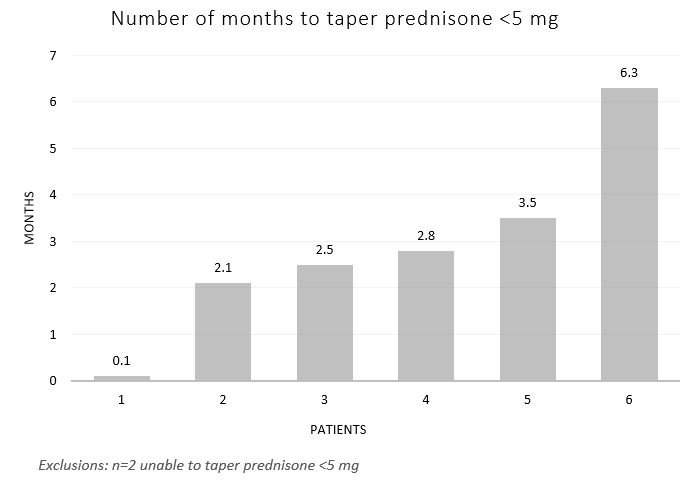Session Information
Date: Monday, November 13, 2023
Title: (1124–1154) Miscellaneous Rheumatic & Inflammatory Diseases Poster II
Session Type: Poster Session B
Session Time: 9:00AM-11:00AM
Background/Purpose: Sarcoidosis is a systemic inflammatory disease characterized by non-necrotizing granuloma formation affecting the lung, lymphatics, heart, skin, eye, kidney, and, in neurosarcoidosis, the nervous system. Neurosarcoidosis has varied manifestations, including central and peripheral neuropathies, parenchymal disease, meningitis, and myelopathy. Despite the complications of chronic steroid use, there is currently no consensus on preferred steroid-sparing treatments for neurosarcoidosis.We aim to describe the clinical course of patients treated with tumor necrosis factor (TNF) inhibitors as the first steroid-sparing agent.
Methods: This is a case series of 8 adults with probable or definite neurosarcoidosis based on Neurosarcoid Consortium Consensus Group criteria. Patients were seen between January 1, 2010 and December 31, 2022 in our rheumatology or neurology clinic, had at least one follow up visit, and received TNF inhibitor therapy as first steroid-sparing agent. Data collected through chart review included demographics, disease characteristics, treatment course, and treatment response.
Results: Of our 8 patients, most were male (n=6) and the median age at diagnosis was 55 (IQR 23). Half were definite diagnoses (n=4), confirmed by brain biopsy. The most commonly involved neurologic tissues were parenchymal (n=7), meningeal (n=4), and spinal (n=3). Outside of neurologic involvement, most patients had lung involvement (n=6) and some had musculoskeletal (n=2) involvement. Based on available cerebrospinal fluid studies, most had elevated protein (n=6), elevated white blood cell counts (n=6), and negative angiotensin converting enzyme (n=7), IgG (n=8), and oligoclonal bands (n=8). Most patients were started on infliximab (n=7), initiated a median of 5.7 months (IQR 8.2) after sarcoidosis diagnosis, and were co-treated with methotrexate (n=7). Most patients were able to wean to < 5 mg of prednisone (n=6) in a median of 2.6 months (IQR 1.3). Most patients had one or fewer relapses (n=7) and achieved partial or complete clinical remission (n=7). A minority of patients had adverse reactions, including pulmonary infection (n=3) and skin infections (n=1); 1 patient died 12 years after diagnosis.
Conclusion: Our study provides further evidence that TNF inhibitors can be used effectively as first-line steroid sparing therapy for neurosarcoidosis. Among our neurosarcoidosis patients treated with TNF inhibitors, most were able to wean from steroids within 6 months and had significant resolution of their symptoms.
To cite this abstract in AMA style:
Morrison T, Lakusta-Wong T, Roy-Hewitson C, Gosselin J, Nevares A. Tumor Necrosis Factor Inhibitors as First Line Steroid-Sparing Therapy for Neurosarcoidosis: A Case Series [abstract]. Arthritis Rheumatol. 2023; 75 (suppl 9). https://acrabstracts.org/abstract/tumor-necrosis-factor-inhibitors-as-first-line-steroid-sparing-therapy-for-neurosarcoidosis-a-case-series/. Accessed .« Back to ACR Convergence 2023
ACR Meeting Abstracts - https://acrabstracts.org/abstract/tumor-necrosis-factor-inhibitors-as-first-line-steroid-sparing-therapy-for-neurosarcoidosis-a-case-series/

